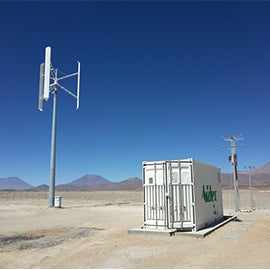Implemented Solutions
Battery Energy Storage System
Stabilize electricity supply to actively promote renewable energy-based smart grid transformation
- NEEDS
- Stable supply of renewable energy
- SOLUTION
- Providing a system that stores power in a battery and responds to supply shortages and excesses within 1 second
Amid the megatrend of decarbonization to curb CO2 emissions, renewable energies are being introduced to a growing number of places in recent years. Among these energies, the markets for photovoltaic and wind power generation are expanding particularly rapidly, but such a power generation system, in which voltage and frequency fluctuate widely, may destabilize an existing power grid if connected to it directly. As the transition to renewable energies continues, power grids become increasingly vulnerable to sudden fluctuation in the amount of power generated and consumed. Thus, to operate grids stably over sudden excess or shortage in power supply, electric power companies need power sources that can reach a complete output or consumption in an extremely short amount of time.
Responding to an electricity supply-related trouble within a second
One of the solutions for such issues is the battery energy storage system (BESS). By saving renewable energy-generated electricity in batteries, electric power companies can use the electricity anytime they need it.
The BESS system that Nidec Industrial Solutions supplied to E.ON, a British company, can respond to a sudden excess or shortage in electricity supply with a response speed of a second or less, the length of time provided in British standards. This system, which has been operating since 2017, comprises two AC/DC converters and two 900kWh battery banks, and is capable of supplying 10MW of electricity, which would power approximately 100 electric vehicles. For easy transport and installation, the BESS system is housed in shipping containers, with each unit equipped with an electric power converter, a transformer, a battery, and a control system.

In the UK, as photovoltaic and wind power generation and other sources of renewable energies are used increasingly, thermal electric power plants are discontinued by stages, with some projects underway to install a BESS where a thermal electric power plant used to be. Nidec Industrial Solutions delivered a 49MW BESS to National Grid, a British company, and installed the system in a thermal electric power plant. This is part of a project to promote the introduction of 200MW nationwide to stabilize power grids’ frequency by absorbing electric power during a peak of power generation and release electric power when the demand for it reaches its peak. This system, which houses a battery module and an electric power converter, a transformer, and a control system, comprises 20 containers that enable plug-and-play operations.
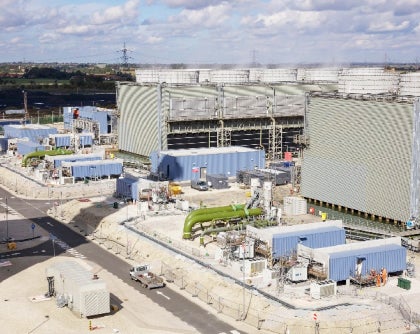
Providing total smart grid solutions
A growing number of BESS units are being introduced in Germany, where the use of renewable energies is rapidly increasing. Nidec Industrial Solutions delivered a BESS system (with a total peak output of 90MW and a total capacity of 138MWh), one of the largest in the world, to Steag Energy Services, the leading electric power company in Germany. This system, with six containers that integrate a 15MW-capacity battery with a control system, enhances electric power grids’ stability and electric quality via frequency adjustment and voltage control, and supports Germany as it adopts renewable energies.
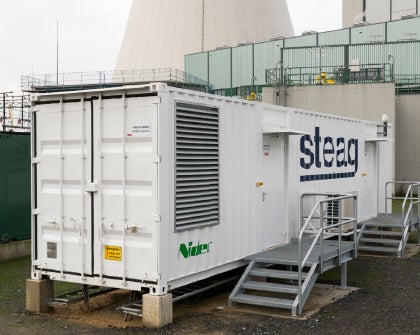
Renewable energies are being introduced to Mediterranean islands as well: Corsica introduced a photovoltaic power generation unit with a BESS to, among other purposes, reduce its dependence on imported oil, and lower energy cost. A system to cover a total of 13MW is being built on the island, and Nidec Industrial Solutions designed, constructed, installed, and tested a plant with a 4.8MW photovoltaic power generation unit and a 7.5MW BESS system, while providing a control system to optimize energy production and consumption. The system’s output prediction function, which enables the plant to forecast its production the day before with an error of 5% or less, is designed to store excess energy from photovoltaic power generation and return it to an electric power grid as necessary.
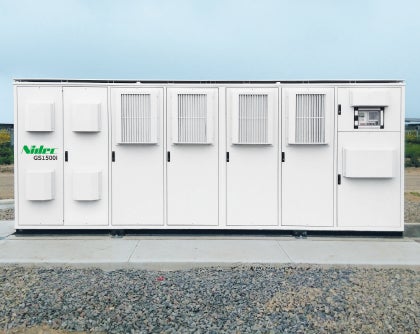
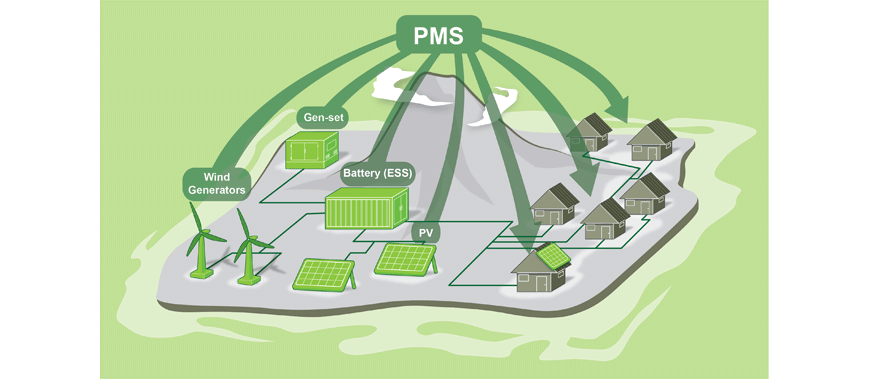
Nidec Industrial Solutions is committed to using revolutionary battery and electricity management technologies to support the adoption of renewable energies and contribute to minimizing greenhouse gas emissions.

